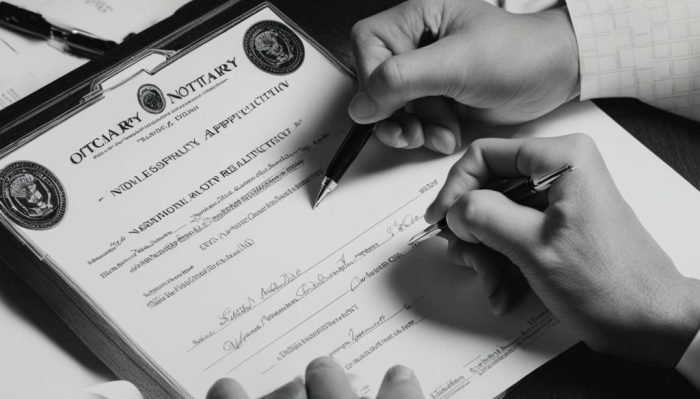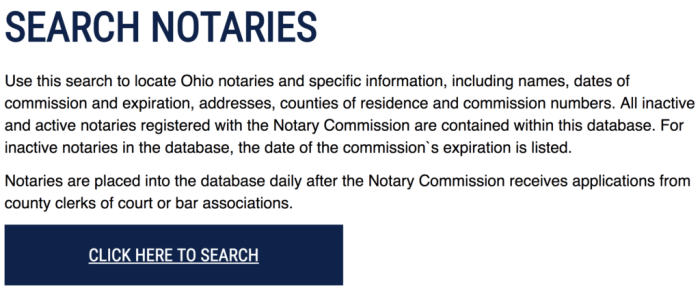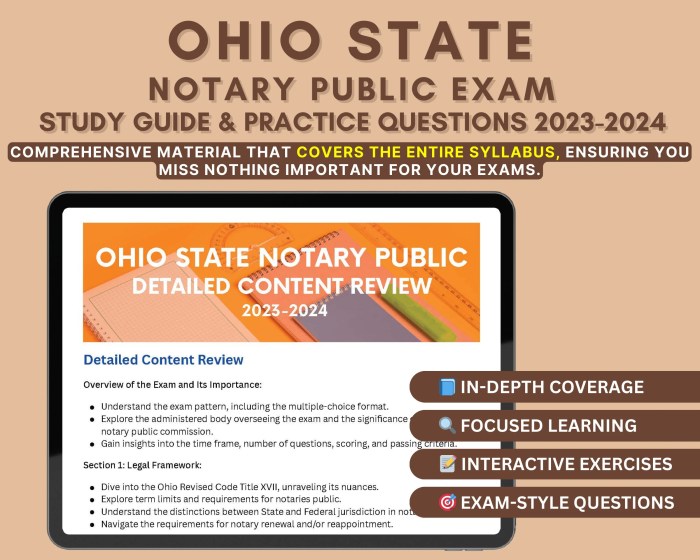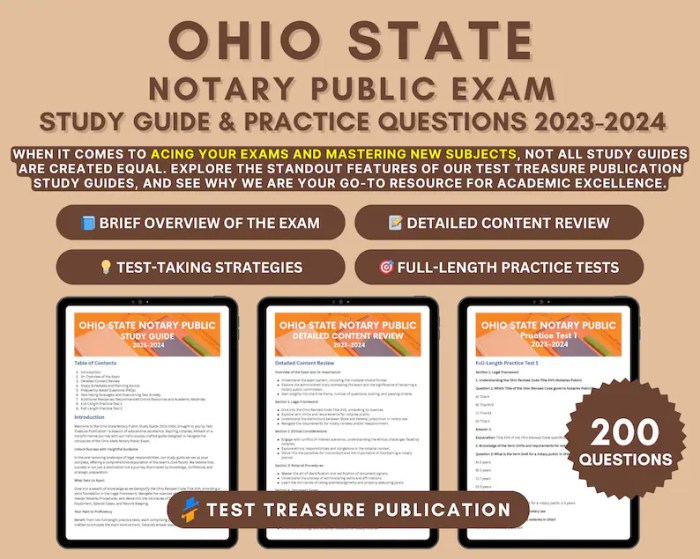Embark on an educational journey with our comprehensive Ohio Notary Study Guide PDF, meticulously crafted to empower you with the knowledge and skills required to excel as a notary public in the Buckeye State.
Delve into the intricacies of Ohio notary laws and regulations, grasp the proper procedures for performing notarial acts, and embrace the ethical responsibilities that come with this esteemed role.
Introduction

This Ohio notary study guide PDF provides comprehensive materials to prepare individuals for the notary public exam. It covers the fundamental concepts, legal requirements, and practical procedures associated with notarization in the state of Ohio.
The guide includes detailed explanations of notary laws and regulations, the proper execution of various types of documents, and best practices for maintaining accurate records. It also offers practice questions and sample documents to enhance understanding and exam preparation.
The Ohio Notary Study Guide PDF is an invaluable resource for aspiring notaries. It covers everything from the basics of notary law to the practical aspects of performing notarial acts. And just like a lay row of tennis balls , this guide will provide you with a solid foundation for your notary career.
Whether you’re new to the field or just need a refresher, the Ohio Notary Study Guide PDF is the perfect resource for you.
Content Overview
The guide is structured into several sections, each addressing a specific aspect of notary public duties and responsibilities. These sections cover topics such as:
- Notary law and ethics
- Document requirements and verification procedures
- Notarial acts and their legal implications
- Recordkeeping and reporting obligations
- Common challenges and best practices
Ohio Notary Laws and Regulations

The Ohio Revised Code (ORC) establishes the legal framework for notaries public in Ohio. The ORC Artikels the requirements for becoming a notary public, their duties and responsibilities, and the penalties for notary misconduct.
Requirements for Becoming a Notary Public in Ohio
To become a notary public in Ohio, individuals must meet the following requirements:
- Be at least 18 years old.
- Be a legal resident of Ohio.
- Not have been convicted of a felony or a crime involving moral turpitude.
- Complete a notary education course approved by the Secretary of State.
- Pass a notary public examination administered by the Secretary of State.
- Obtain a surety bond in the amount of $10,000.
- File an application with the Secretary of State.
Notary Procedures

As a notary public in Ohio, it is crucial to adhere to the proper procedures when performing notarial acts. These procedures ensure the validity and authenticity of the documents you notarize.
Before performing any notarial act, you must verify the identity of the signer. Acceptable forms of identification include a driver’s license, state ID card, or passport. You must also witness the signer’s signature being affixed to the document. This means that you must be present when the signer signs the document and must observe them doing so.
Types of Notarial Acts
Notaries public in Ohio are authorized to perform various types of notarial acts, including:
- Notarizing signatures on documents
- Administering oaths and affirmations
- Taking depositions
- Protesting negotiable instruments
- Certifying copies of documents
Ethics and Professionalism

Notaries public hold a position of trust and responsibility, and as such, they are bound by a strict code of ethics. These ethical responsibilities include maintaining confidentiality, preventing fraud, and acting with integrity in all their dealings.
Maintaining confidentiality is essential for notaries public. They must not disclose any information about a document or transaction that they have notarized, unless they are required to do so by law. This includes information about the parties involved, the nature of the document, and the date and time of the notarization.
Preventing Fraud
Notaries public also have a responsibility to prevent fraud. They must be vigilant in identifying and reporting any suspicious activity. This includes checking the identification of the parties involved, verifying the authenticity of the documents being notarized, and being aware of the signs of fraud.
Acting with Integrity
In all their dealings, notaries public must act with integrity. They must be honest, fair, and impartial. They must not allow their personal interests to interfere with their professional responsibilities.
Practice Exercises

This section provides practice exercises to help students test their understanding of the material covered in the study guide. By completing these exercises, students can reinforce their knowledge and identify areas where they need further review.
Sample notary forms and documents are also included for students to practice with. These documents will help students become familiar with the different types of documents that notaries public are required to notarize and the procedures that must be followed.
Notary Forms and Documents
The following is a list of sample notary forms and documents that students can use to practice:
- Acknowledgment
- Jurats
- Protests
- Oaths
- Affidavits
Practice Questions, Ohio notary study guide pdf
The following is a list of practice questions that students can use to test their knowledge of the material covered in the study guide:
- What are the qualifications to become a notary public in Ohio?
- What are the duties and responsibilities of a notary public?
- What are the different types of documents that notaries public are required to notarize?
- What are the procedures that must be followed when notarizing a document?
- What are the ethical and professional obligations of a notary public?
Question Bank: Ohio Notary Study Guide Pdf
What are the requirements to become a notary public in Ohio?
To qualify, you must be a legal resident of Ohio, at least 18 years of age, and have not been convicted of a felony or certain misdemeanors.
What types of notarial acts are commonly performed in Ohio?
Notaries in Ohio commonly notarize signatures, administer oaths and affirmations, and certify copies of documents.
What are the ethical responsibilities of notaries public?
Notaries must maintain confidentiality, prevent fraud, and act impartially in their dealings with the public.